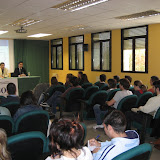About the Digital Agenda Assembly and Open Data licenses
On June 16th I was lucky to be one of the 1300 participants in Brussels at the 1st Digital Agenda Assembly, the first high-level event organized by the European Commission about the Digital Agenda for Europe. The main objective was to evaluate the development of objectives and actions of the Europe's Digital Agenda, which as you know is one of the 7 strategic actions of the Europe 2020 strategy, aimed to put Europe on the path of smart, sustainable and inclusive growth. That's nothing.
 |
| by Jose M. Alonso |
I was also honoured to be a speaker at the seminar held in the plenary room: "Open data and re-use of public sector information", where I talked about Euroalert and our experience building a business powered by open data that provides information services about public procurement for European PYMEs. At Euroalert's blog you can find more information about the presentation, that was live streamed, and the pictures taken Jose M. Alonso.
The two days were pretty intense and lots of discussions took place, many as a follow-up to the May Share PSI seminar, either in person or via twitter (see hashtag #daa11psi and stats). You can find a great summary at the Open Data@CTIC blog. I'm going to focus on two important details and one announcement that I'd like to share with you.
The first one is the speech about the State of the Digital Union, as vice president Neelie Kroes called her speech at the first plenary session. I recommend you to have a look at it, because in these times of illiterate politicians when it comes to technology, this remarkable woman is an inspiration. I never imagined I would recommend here the speech of a politician. I hope she will achieve all these ambitious goals.
The second one is a tweet from Michele Barbera, quoting Federico Morando, which did not have a big impact, though it represents an important topic I've been discussing with members of the open data community and which I find extremely important for the development a pan-european market for data re-use.
Many of us believe that if the future revision of the PSI directive endorse a simple license, applicable by default to datasets released by governments, a critic roadblock would be removed, especially for companies that operate with pan-European vision. From the point of view of a company like Euroalert, that creates value from data aggregated from multiple sources and countries, a unique EU license would contribute with legal certainty to operations in the single digital market
It seems to me that the pursuit of interoperability for the growing number of data licenses is becoming a grail that threatens to appear as one of the greatest barriers to data re-use.The idea implemented in the draft of the Spanish PSI Royal Decree, which includes as an Annex a very simple license to be applicable by default, in my opinion would be ideal to be copied into the new directive. Maybe with a EU logo or seal recognizable to all operators... but I am not qualified to judge which one is the best license to be included and endorsed by the directive.
Moreover, thanks to the long networking sessions (great success) of the DAA, I was finally able to spend some time with Chris Taggart figuring out how Euroalert and Open Corporates can exchange data and information for the benefit of our users and the Open Data community at large. Soon we will be releasing more details of what we hope will be a small contribution to the European single market.
The truth is that I came back very happy to belong to such an active and motivated community which is luring more and more members everyday and that step by step is becoming mainstream. Too bad that in this June full of events I have missed the great OKCon2011 in Berlín. You can not be everywhere.
















